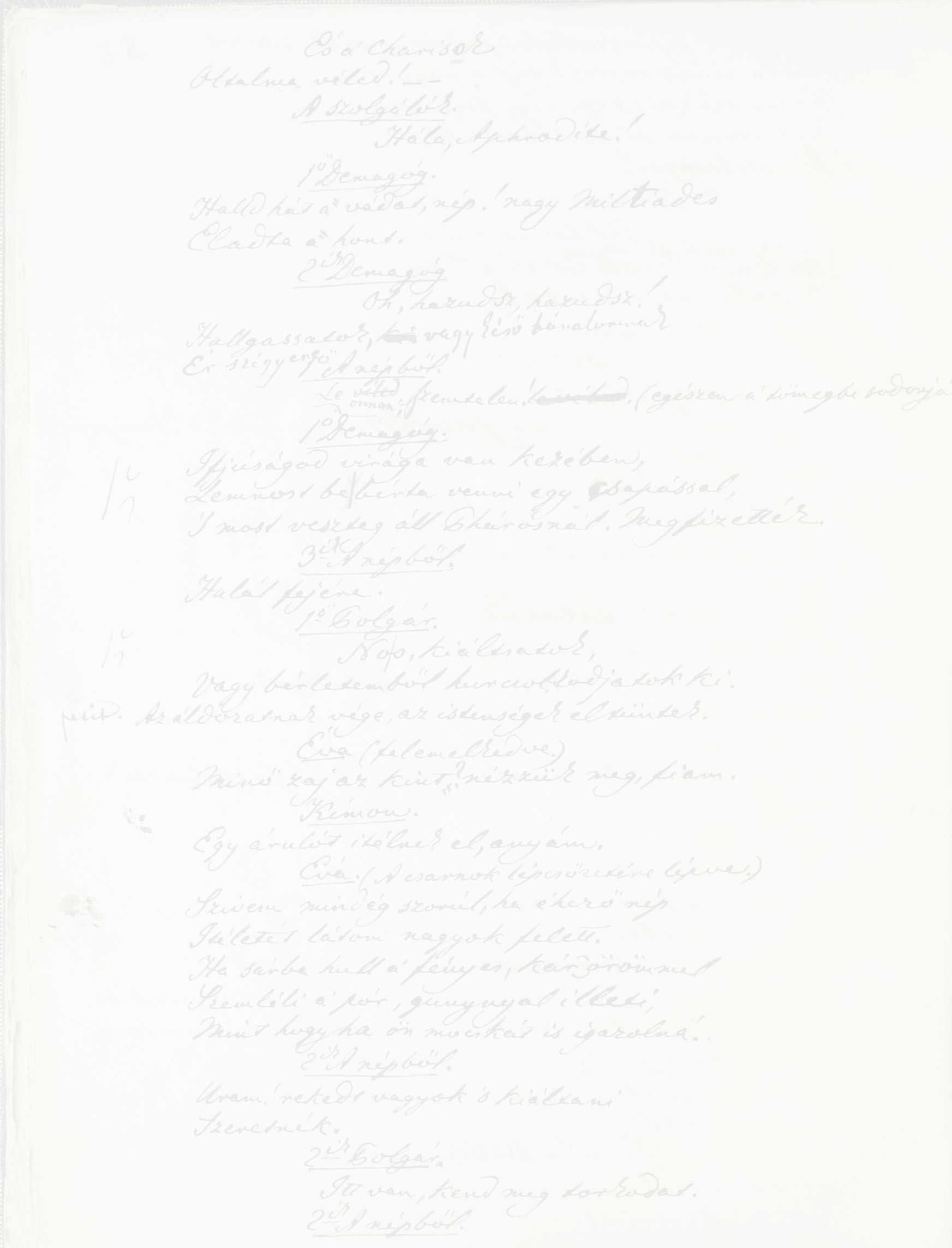


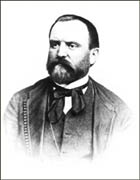 Madách worked on the Tragedy since 17 February 1859, almost secretly,
so that none
of his family members and close friends were aware of the work in preparation.
However, after he completed it on 26 March 1860,
1
like every artist, he also had the natural desire to “show himself”, to seek the
opinion of others. He first read the Tragedy to Pál
Szontagh (1820–1904) in the spring of 1860.
2
This prominent figure of the aristocratic opposition in Nógrád county had been linked by
ties of friendship to Madách since the 1840s, and since the 1850s he had lived in Horpács, next to Alsósztregova. Szontagh and Madách regularly met, thus it was
obvious that Madách trusted him. However, as a friendly opinion could be more
partial than that of an outsider, therefore Szontagh urged Madách
3
to send the Tragedy to János Arany for criticism. The author of Toldi
was the unquestioned literary authority of the period, and his word had the most
weight.
Madách worked on the Tragedy since 17 February 1859, almost secretly,
so that none
of his family members and close friends were aware of the work in preparation.
However, after he completed it on 26 March 1860,
1
like every artist, he also had the natural desire to “show himself”, to seek the
opinion of others. He first read the Tragedy to Pál
Szontagh (1820–1904) in the spring of 1860.
2
This prominent figure of the aristocratic opposition in Nógrád county had been linked by
ties of friendship to Madách since the 1840s, and since the 1850s he had lived in Horpács, next to Alsósztregova. Szontagh and Madách regularly met, thus it was
obvious that Madách trusted him. However, as a friendly opinion could be more
partial than that of an outsider, therefore Szontagh urged Madách
3
to send the Tragedy to János Arany for criticism. The author of Toldi
was the unquestioned literary authority of the period, and his word had the most
weight.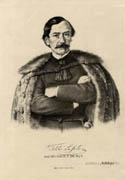 In the spring of 1861 Madách had the opportunity to let his work get to Arany.
As one of the parliamentary deputies of Nógrád county, Madách came to the
national assembly, opened on 6 April 1861 in Pest, and brought with himself the
only, handwritten copy of the Tragedy. We have no irrefutable evidence
that Madách met Arany, but on the basis of indirect data both their
contemporaries and Ferenc Kerényi
4
– one of the best Madách researchers of the past decades – have been
inclined to think that Madách personally handed over his work. Kerényi also
risks the assumption that the meeting took place on 5 June 1861, after Madách’s
highly successful parliamentary speech. Concerning the parliament’s answer to be
given to Emperor Francis Joseph, Madách represented the opinion of the
Resolution Party, led by László Teleki. According to Kerényi, his speech might
have provided him with enough confidence to visit Arany in his home at Üllői
street. Madách’s obituary published in the Koszorú, the journal of János Arany
recalls the meeting in the following words: “[Madách] asked his fellow deputy
Pál Jámbor to take him to Arany, to whom he would like to hand over a work for
criticism. Pál Jámbor fulfilled his wish. Arany accepted the work from the
unknown poet, who asked him for a sincere opinion, and spoke little during the
whole visit.”
5
According to Ferenc
Kerényi, the “U” signature of the above obituary points to Pál Gyulai, whose
information – being one of János Arany’s most confidential friends – certainly
came from first hand.
In the spring of 1861 Madách had the opportunity to let his work get to Arany.
As one of the parliamentary deputies of Nógrád county, Madách came to the
national assembly, opened on 6 April 1861 in Pest, and brought with himself the
only, handwritten copy of the Tragedy. We have no irrefutable evidence
that Madách met Arany, but on the basis of indirect data both their
contemporaries and Ferenc Kerényi
4
– one of the best Madách researchers of the past decades – have been
inclined to think that Madách personally handed over his work. Kerényi also
risks the assumption that the meeting took place on 5 June 1861, after Madách’s
highly successful parliamentary speech. Concerning the parliament’s answer to be
given to Emperor Francis Joseph, Madách represented the opinion of the
Resolution Party, led by László Teleki. According to Kerényi, his speech might
have provided him with enough confidence to visit Arany in his home at Üllői
street. Madách’s obituary published in the Koszorú, the journal of János Arany
recalls the meeting in the following words: “[Madách] asked his fellow deputy
Pál Jámbor to take him to Arany, to whom he would like to hand over a work for
criticism. Pál Jámbor fulfilled his wish. Arany accepted the work from the
unknown poet, who asked him for a sincere opinion, and spoke little during the
whole visit.”
5
According to Ferenc
Kerényi, the “U” signature of the above obituary points to Pál Gyulai, whose
information – being one of János Arany’s most confidential friends – certainly
came from first hand.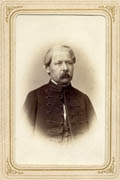 Arany soon began to read the Tragedy but he did not like it, as after
some lines he suspected it to be an afre-feeling of the Faust. The first
Hungarian translation of Goethe’s masterpiece had been published a year ago,
6
thus the suspicion of Arany was legitimate. In his letter of 27 October 1861 to
Madách, summarizing his suggestions and corrections, he commented the following
words of Lucifer in Scene 2: “You elements, Lend aid, arise–– Humanity Will be your prize.––” like this: “…it is like Goethe, in István Nagy’s
translation.”
7
Arany soon began to read the Tragedy but he did not like it, as after
some lines he suspected it to be an afre-feeling of the Faust. The first
Hungarian translation of Goethe’s masterpiece had been published a year ago,
6
thus the suspicion of Arany was legitimate. In his letter of 27 October 1861 to
Madách, summarizing his suggestions and corrections, he commented the following
words of Lucifer in Scene 2: “You elements, Lend aid, arise–– Humanity Will be your prize.––” like this: “…it is like Goethe, in István Nagy’s
translation.”
7
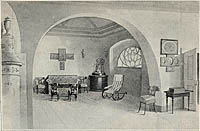 After the dissolution of the parliament, Madách came home to Alsósztregova on 1
September 1861, and was obviously looking forward with impatience to a sign from
the senior fellow poet. Arany sent his famous letter with the address “Dear
Patriot!” on 12 September: “The tragedy of man is an excellent work
both in its conception and composition. I only find some ponderosity here and
there in its poesy and its language; especially the lyric parts are not sonorous
enough. But even like this, after some external touches, it could occupy a place
among the most excellent works of our literature. I do not know what are your
intentions as to its publication: I would wish to promote it through the
Kisfaludy Society, and I hope I would succeed in doing so. If my wish met your
will, then I would mark the places, from line to line, where I would suggest
some – but by no means essential – changes; or if you agree, I myself would add
to it a few pen strokes, and then I would present it to the Society.”
10
After the dissolution of the parliament, Madách came home to Alsósztregova on 1
September 1861, and was obviously looking forward with impatience to a sign from
the senior fellow poet. Arany sent his famous letter with the address “Dear
Patriot!” on 12 September: “The tragedy of man is an excellent work
both in its conception and composition. I only find some ponderosity here and
there in its poesy and its language; especially the lyric parts are not sonorous
enough. But even like this, after some external touches, it could occupy a place
among the most excellent works of our literature. I do not know what are your
intentions as to its publication: I would wish to promote it through the
Kisfaludy Society, and I hope I would succeed in doing so. If my wish met your
will, then I would mark the places, from line to line, where I would suggest
some – but by no means essential – changes; or if you agree, I myself would add
to it a few pen strokes, and then I would present it to the Society.”
10
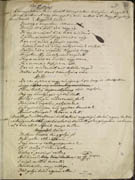 “It’s done, the great act of creation.
“It’s done, the great act of creation.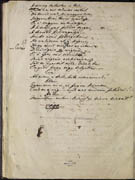 One
adage, however, was associated with Arany’s name without any basis. There were
theater directors who omitted the famous final verse – “Man, I have spoken: strive on, trust, have faith!” – by saying that it was not from Madách. However, even
no polar filter test would have been necessary, only a glimpse at the original
manuscript, to be ascertained of the contrary view! Nevertheless, the
handwriting expert asked for the examination of the manuscript checked the final
verse with x-ray, and it became clear that János Arany did not touch it.
One
adage, however, was associated with Arany’s name without any basis. There were
theater directors who omitted the famous final verse – “Man, I have spoken: strive on, trust, have faith!” – by saying that it was not from Madách. However, even
no polar filter test would have been necessary, only a glimpse at the original
manuscript, to be ascertained of the contrary view! Nevertheless, the
handwriting expert asked for the examination of the manuscript checked the final
verse with x-ray, and it became clear that János Arany did not touch it.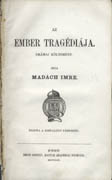 especially concerning the few typographical errors which,
with all my efforts, had slid into the publication, as well as on the changes
you have unlimitedly authorized me to, but in which I limited myself to those
already reported to you. I also mentioned that if you are displeased with them,
in a second edition – of which, thank God, will be urgent need soon – you
can restore the original text (your manuscript is still at me, in a usable
condition).
29
especially concerning the few typographical errors which,
with all my efforts, had slid into the publication, as well as on the changes
you have unlimitedly authorized me to, but in which I limited myself to those
already reported to you. I also mentioned that if you are displeased with them,
in a second edition – of which, thank God, will be urgent need soon – you
can restore the original text (your manuscript is still at me, in a usable
condition).
29
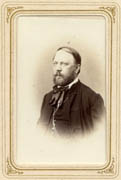 In his answer, Madách dispelled Arany’s concerns: “I only owe gratitude for your
changes, and the typographic errors are amazingly few.”
30
In his answer, Madách dispelled Arany’s concerns: “I only owe gratitude for your
changes, and the typographic errors are amazingly few.”
30
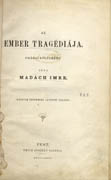 In the “second, substantially improved” edition, which was
also published by Gusztáv Emich in 1863, Madách also took his observations into account. As
this was the last edition published in the poet’s life, now this version is
considered the final text of the Tragedy.
In the “second, substantially improved” edition, which was
also published by Gusztáv Emich in 1863, Madách also took his observations into account. As
this was the last edition published in the poet’s life, now this version is
considered the final text of the Tragedy.